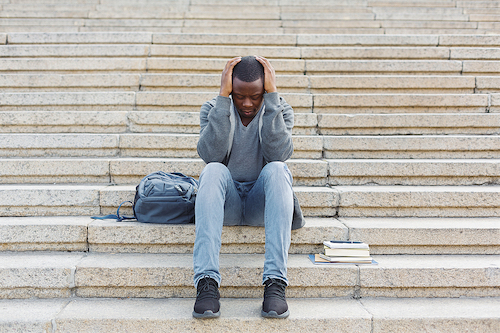 Feeling lonely has a greater impact on sleep for college students than too much screen time.
Feeling lonely has a greater impact on sleep for college students than too much screen time.
Research from Oregon State University found that students with high levels of loneliness were more likely to have difficulties sleeping compared with less lonely students, regardless of their level of screen time.
“More screen time is indeed associated with greater insomnia symptom severity. However, this was only the case for those who were not very lonely. Those who were lonely had greater levels of insomnia regardless of amount of screen time. Moreover, lonely students were almost twice as likely to report insomnia than less lonely counterparts,” John Sy, co author of the study and a graduate student in OSU’s School of Psychological Science told Theravive.
“I have always been interested in loneliness and how it affects our health and behaviors. Loneliness is associated with a host of negative mental and physical health outcomes including insomnia. Screen time has been commonly implicated for poor sleep, but the results were mixed. Our study attempted to disentangle the effects of loneliness and screen time among young adults, who have high levels of loneliness and screen use. By disentangling the two, we hope to gain a better understanding of their individual and combined effects on sleep health. We also hoped to shed light in the inconsistencies regarding the relation between screen time and insomnia.”
As part of the study, the researchers focused on 1000 undergraduate students. They found that if a student reached a total daily screen time of eight to 10 hours or more, they had an increased likelihood of experiencing insomnia.
They found that 35% of participants had high levels of loneliness, and that these students had more trouble sleeping than students who were less lonely.
The 35% who reported high levels of loneliness also reported clinically significant symptoms of insomnia nearly twice as much as those who didn’t report high levels of loneliness.
“Loneliness is more strongly associated with insomnia than screen time. It may be more important to prioritize psychological factors such as loneliness when addressing insomnia over screen time,” Sy said.
Loneliness can have a significant impact on health and wellbeing. The researchers say it can impact sleep due to the association between loneliness and greater sensitivity to stress as well as ruminating over stressful events.
“Work by Drs. Cacioppo and Hawkley proposed that it's likely due to hypervigilance. This hypervigilance stems from the lack of feelings of safety and security brought about by loneliness. Loneliness was also associated with rumination, stress, and depression which are disruptive to sleep,” Sy said.
The US Surgeon General’s 2023 Advisory on loneliness and isolation notes that one in two adults in America experience loneliness.
Loneliness is associated with a greater risk of stroke, depression, dementia, cardiovascular disease, anxiety and premature death.
The impact on mortality due to loneliness is similar to the mortality risk caused by smoking up to 15 cigarettes every day. It is even more harmful to mortality risk than obesity and physical inactivity.
The researchers say Universities can play an important role in helping their students feel less lonely.
“We encourage universities to invest in opportunities for students to find a place to belong, such as student organizations, cultural centers, and even virtual spaces. Increased access to mental health services would also be beneficial. Because loneliness is perceived social isolation and has been associated with depression, it is important for students experiencing loneliness to be able to easily seek mental health support,” Sy said.
“However, I also want to recognize that the relation of loneliness and insomnia is bidirectional. It is important for universities to have resources for addressing insomnia, such as therapists trained in cognitive behavioral therapy for insomnia (CBT-I). Alleviating insomnia may have beneficial effects on loneliness, but more studies need to be done in order to determine this.”
Elizabeth Pratt is a medical journalist and producer. Her work has appeared on Healthline, The Huffington Post, Fox News, The Australian Broadcasting Corporation, The Sydney Morning Herald, News.com.au, Escape, The Cusp and Skyscanner. You can read more of her articles here. Or learn more about Elizabeth and contact her via her LinkedIn and Twitter profiles.